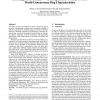200 search results - page 39 / 40 » Higher order models for fuzzy random variables |
ASPLOS
2008
ACM
13 years 9 months ago
2008
ACM
The reality of multi-core hardware has made concurrent programs pervasive. Unfortunately, writing correct concurrent programs is difficult. Addressing this challenge requires adva...
STOC
1997
ACM
13 years 12 months ago
1997
ACM
We present randomized constructions of linear-time encodable and decodable codes that can transmit over lossy channels at rates extremely close to capacity. The encoding and decod...
DSN
2004
IEEE
13 years 11 months ago
2004
IEEE
Advanced molecular nanotechnology devices are expected to have exceedingly high transient fault rates and large numbers of inherent device defects compared to conventional CMOS de...
CVPR
2012
IEEE
11 years 10 months ago
2012
IEEE
The automatic extraction and labeling of the rib centerlines is a useful yet challenging task in many clinical applications. In this paper, we propose a new approach integrating r...
AI
2008
Springer
13 years 7 months ago
2008
Springer
We make a number of contributions to the study of the Quantified Constraint Satisfaction Problem (QCSP). The QCSP is an extension of the constraint satisfaction problem that can b...

